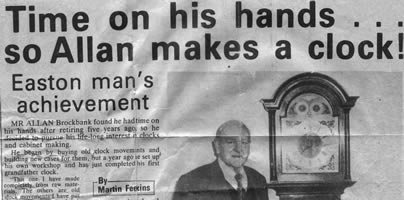Clocks
I have collected a number of clocks over the years and also repaired a few for family and friends. I have not generally kept a record of the various clocks that I own or have passed through my hands but this might change as I hope (2016) to be able to devote more time to this hobby in the coming years now that most of the major works on the house had been completed.
However I have made notes of a few clocks that where they have been of interest and here is a list - click on the listing for more info. Also I felt it was appropriate to acknowledge the input of Allan to my interest in clocks and have written a short note.
| Barry's Vienna Wall clock | Ian Hall's Vienna wall clock |
| Fred's mantle clock | Denise's 30 hour Grandfather |
| Jude's clock |
Allan Brockbank
(my (step) father-in-law and clock mentor.)
Allan was Jean's uncle and also her
step-father as Betty (Jean's mum) married Alan who was her first
husband Stephen's brother. Stephen died before we were married
and Alan did not come onto the scene for some years but he was
always Grandpa Allan. I had a lot of time for Allan as his
outlook on life and his interests were similar to mine; also he
introduced me to serious clock work.
I had always had something of a casual fascination to clockwork; my earliest recollection was when I was less than ten years old I took the family mantle clock to pieces and presented my father with a pile of pieces; to his everlasting credit I was not scolded and he managed to reassemble the parts!
My first serious attempt at clock repair
was the
I had expressed an interest in clocks, in the early days of knowing Allan, and wrote to him for advice. His reply can be seen HERE. We then fostered quite close clock relationship, with him as the teacher and me his apprentice. I got reasonable proficient at disassembling clocks, cleaning the parts, re-bushing and even cutting gears. When Allan died he bequeathed me his tools and a couple of his clocks on the understanding that I completed and unfinished project that he had been working on.
Since then I have picked up and dropped clock work and apart from the occasional repair, for a friend or family, the hobby has languished.
That leads conveniently into a summary of Allan’s achievements that is quite well expressed in an article in the Rutland and Stamford Mercury transcribed as follows from a rather tatty copy of the press cutting can be found by clicking on the image below.
MR ALLAN Brockbank found he had time on
his hands after retiring five years ago, so he decided to pursue
his lifelong interest in clocks and cabinet making. He began by
buying old clock movements and building new cases for them, but
a year ago he set up his own workshop and has just completed his
first grandfather clock.
"This one I have made completely
from raw materials. The others are old clock movements I have
put into new cases, but I got more interested and decided to
make the parts myself” said Mr Brockbank, of
Workshop
But before he could start making a clock
he had to learn more about the subject which he has done from
books. He also had to make his own workshop.
“An awful lot of
time was spent making the tools and equipment” he sad.
Mr
Brockbank’s first attempt at clock making was an ambitious one.
The movement is made of brass and steel and cabinet is oak. But
the most outstanding feature is the perpetual calendar built
into the mechanism. It is designed to count the correct number
of days for each month and also to take account of leap years.
Having made the tools for his workshop and spending nine months
making his first clock he now had bigger ideas.
“I am now starting a second one and it
will be quicker and better. The new one will be a striking and
chiming clock and will again have a perpetual calendar. Mr
Brockbank worked as and engineer for Peter Perkins in
“Most of the methods I am using are those
used by the old craftsmen, not those used by modern mass
production.
“I think that it is important that the old crafts
are maintained and kept going and I think they will be. The
value of mechanical clocks is going up and up all the time.”
Capital
Anyone thinking of taking up the craft of cabinet making or clock making even as a hobby like Mr Brockbank need quite a lot of capital behind them. “It would cost not less that £600 to set up a workshop but it would depend on how much you make yourself and how ambitious you are,” he said
